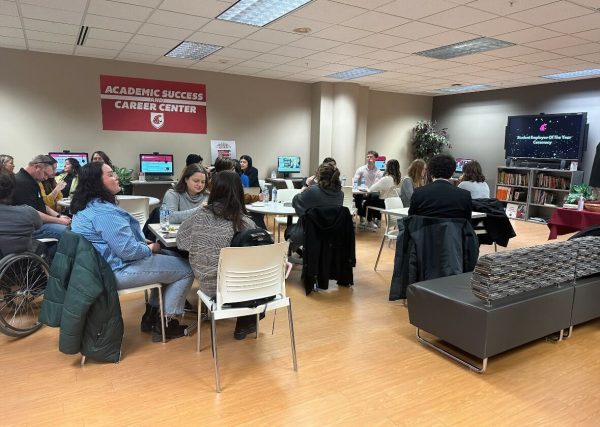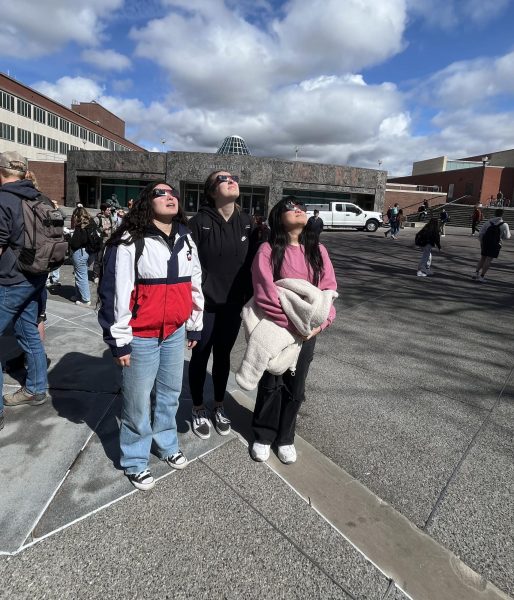Changing public policy can sustain research
September 30, 2013
Through the study of anthropologic culture, environmental archaeologists strive to turn scientific research into implemented American public policy.
The Foley Institute’s Coffee and Politics series introduced Christian Wells, an associate professor from the University of South Florida, on Friday. Wells presented an analysis of his latest explorations in Tampa Bay, Fla., and his findings revolve around the belief of research-based policy used to create cultural and sustainable development laws within the United States.
Wells said understanding the concept of research-based policy begins with defining culture, but from an anthropologist’s perspective.
“If I ask my undergraduate students for example, their immediate reaction is, well, fine art and classical music,” he said. “When I say culture, I really mean looking at people’s world views, people’s values and beliefs and how that influences their behaviors.”
From Belize to Mexico to the Roatan Islands in the Caribbean, much of Wells’ research for the past 15 years has focused on the impacts of global tourism.
Ecological resiliency, otherwise known as the process of a community to recover and rebuild after a natural disaster, has led Wells to the inland waters of Tampa Bay, Fla.
Wells said extracting sediment cores from the Tampa Bay water shed has provided a mirror into the past. Carbon dating fossils and pieces of wood have allowed anthropologists to determine the correlation of population statistics and sea level rises.
It was 7,000 years ago when the sea level began to rise forming the demography of Tampa Bay, Wells said. As sea levels continue to rise in the coming centuries, certain infrastructures are at risk of not existing in 100 years, he said.
MacDill Air Force Base will be submerged under water, retirement communities will have flooded and much of the St. Petersburg section of Tampa Bay will turn into a web of small islands, he explained.
The White House Office of Sciences and Technology announced an initiative in July that would examine scientific research in academic institutions as a source of evidence on which to base policy decisions.
The Social and Behavioral Sciences Research Initiative “explores how academic findings from these fields can be used to design public policies that work better, cost less and help people to achieve their goals,” according to the government document.
It is the first time in the nation’s history, Wells said, that the U.S. Federal Government is asking universities, in particular anthropology and sociology departments, to take part in developing public policy.
“This is really an opportunity for academic institutions to begin to form new research designs and new research studies that respond specifically to this initiative,” he said. “This is an opportunity to make a really big impact on the national level.”
There are a number of challenges when it comes to developing evidence-based research and translating it into public policy.
“You have to learn to be friends with people who are very socially different than you are,” Wells said. “In the end if you can get the synergy worked out, there are a lot of payoffs for this kind of research.”
Graduate student Matt Morino, said Wells’ discussion emphasized the importance of anthropology as an increasingly needed profession in the U.S., especially in Florida, where he explained the state has dealt with political controversy surrounding anthropology degrees.
“It was a great presentation, not only for the implications it has for research and policy making on climate change, also in regard to presenting anthropology as a STEM science, especially in Florida with the comments of our government saying it has to do a lot with funding,” Morino said. “It’s crucial to society as a whole, but also to anthropology as a discipline.”
Richard Elgar, assistant director of the Foley Institute, believes inviting Wells to speak to the WSU community is an appropriate tie-in with the idea of how various public policies are made law.
“This fits in very well with our whole public policy series about how policy is determined and that way this particular talk really added something to the conversation,” he said.





















